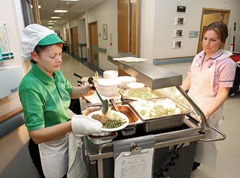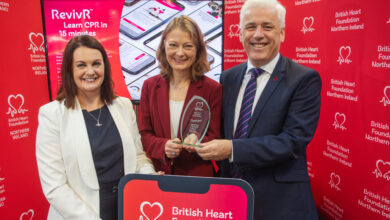Improving quality in acute care
 The health regulator’s report highlights room for improvement.
The health regulator’s report highlights room for improvement.
A major report into older people’s experiences in acute care was published by the Regulation and Quality Improvement Authority (RQIA) in March, based on 11 unannounced inspections, 139 interviews and 216 questionnaires with patients, relatives and carers, and a review of patients’ notes and other relevant documents.
RQIA Chief Executive Glenn Houston commented that staffing is “a crucial issue” in this aspect of care. It is also essential to ensure privacy and dignity and to avoid situations where men and women are being cared for in mixed wards – often as a result of bed pressures.
In general, the inspectors found that nurses on wards are effective managers and leaders who raise inadequate staffing levels with senior trust staff. There is a “heavy reliance” on bank and agency staff in some wards and nurses are frequently required to provide cover at short notice. It is difficult to balance clinical care, management responsibilities and training time.
Wards are generally clean, bright and well-maintained with a generally “calm and welcoming” atmosphere despite the pressures on staff. “Ward clutter” is a problem for all trusts and storage space is limited in many facilities. Most wards have not been assessed for their appropriateness for dementia patients but some signage in ward bays and sanitary areas has been improved.
The majority of staff (across all wards) are courteous and respectful to patients and visitors and privacy and dignity are generally maintained. Some patient call systems are old and need to be replaced e.g. call bells being out of reach of patients or not answered promptly. There are occasional lapses where privacy curtains are not fully drawn.
Hospitals provide a good choice of warm meals which normally appears to be appetising. Sometimes, though, there are not enough staff to help patients during mealtimes and inappropriate cutlery and crockery are given out. There are varying systems for identifying patients who have a particular need for help and those who are most in need are sometimes not identified.
A large number of fluid balance charts and food intake charts are “inadequately and inaccurately completed” despite a drive to improve the consistency and quality of this information. The recording of patient care is also inconsistent with records frequently failing to demonstrate that care is either safe or effective or that patients’ needs are being adequately assessed.
Empathy, support and appropriate explanations of care are the norm when staff communicate with patients but a small number of staff are not respectful or dignified. When this was observed, these staff were reported to ward sisters by the inspectors.
Fourteen recommendations are set out, including an increase in nurse staffing levels, giving nurses more time for management duties and training (e.g. in dementia care), and providing nurses with formal reports on incident trends.
All staff need to “understand and demonstrate that older patients are treated with compassion, dignity and respect” and that privacy must be maintained at all times. This should involve checking individual patients at defined regular intervals to anticipate what care they will need. Patients’ care also needs to be recorded accurately and consistently across all trusts.





